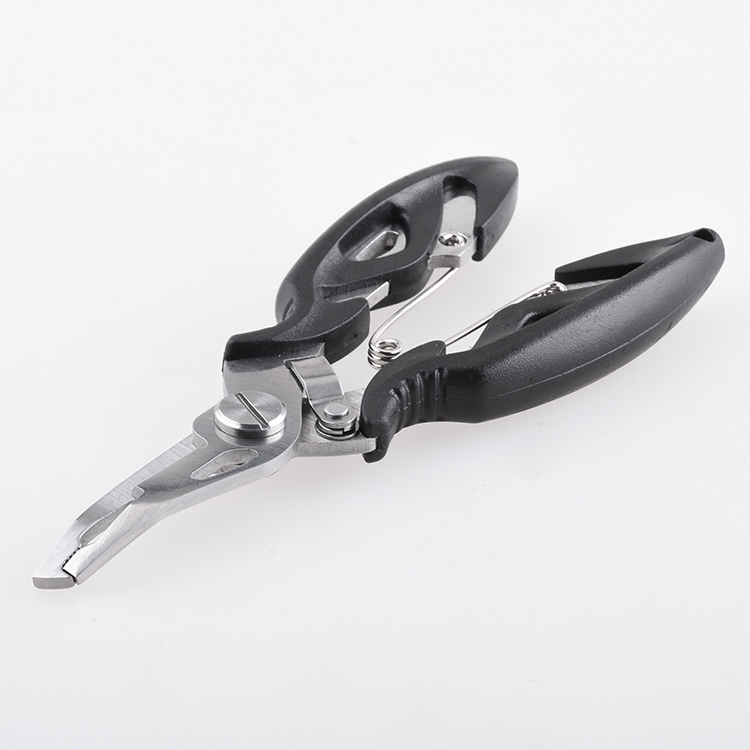



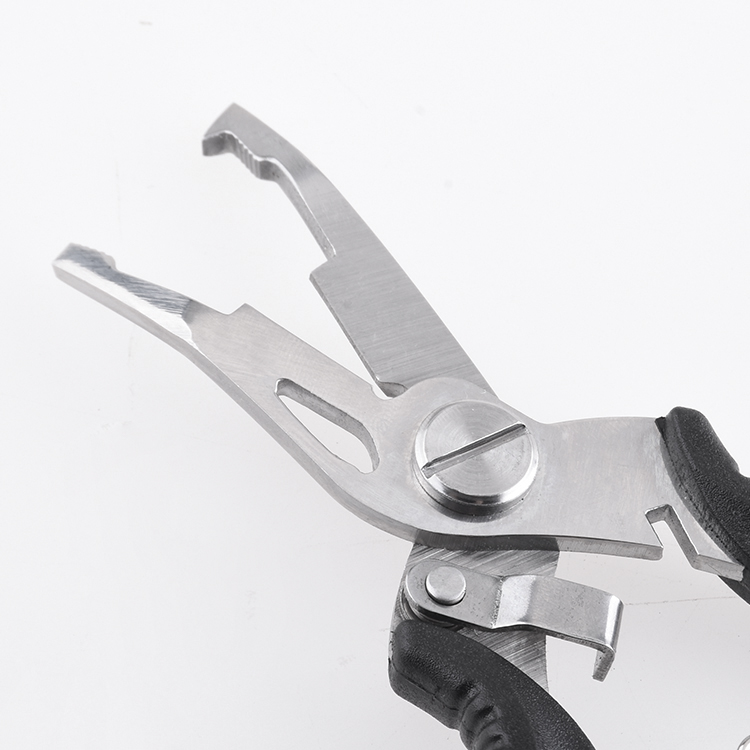

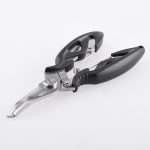
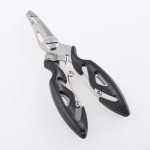
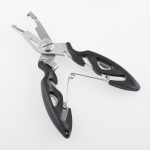
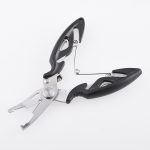


Numéro d'article : RRH-F-316
Segment d'articles : Pinces de pêche
Matériau du corps principal : 2CR13
Matériau du manche : abdos
Longueur fermée : 4.84” / 123mm
Épaisseur totale: 1,69" / 43 mm
Hauteur totale: 0.09” / 2.35mm
Longueur de lame : 2.05” / 52mm
Lester: 1.85 oz / 52.5g
Couleur de la poignée : Noir
Finition corps principal : Satin
Finition manche : abdos
MOQ régulier : 3000
In the world of angling, the tools we select become an extension of our skill—none more so than the RRH-F-316 FEO fishing pliers. With their sleek, small tool design and robust construction, they represent the pinnacle of portable, dependable angling accessories. This description offers you a comprehensive tour of the RRH-F-316 fishing pliers, designed and supplied by Shieldon Manufacturing & Trading Combo business, showcasing why this powerful little tool is an essential purchase for the discerning angler.
Product Introduction
Introducing the RRH-F-316 fishing pliers: a nimble, yet powerful tool forged for the angler who values precision and portability. Manufactured by the trusted Shieldon brand, these pliers are the embodiment of function and form intertwined, ensuring that no matter where your fishing adventures may take you, success is only a squeeze away.
Technical Specifications:
Advanced Features & Design
The design of the RRH-F-316 fishing pliers is no mere afterthought; it is a deliberate creation tailored for the tactician angler. Every curve and contour is purposed to provide the ultimate user experience:
Ideal for Customization
Shieldon recognizes that in the world of fishing gear, personalization is key. The RRH-F-316 allows for custom color variations on its ABS handle, offering a tailored aesthetic for businesses or individual anglers who desire a bespoke touch to their tools.
Application & Utility
The RRH-F-316 is not a mere accessory; it is an angling essential. Its multifunctional capabilities include but are not limited to:
An Investment in Excellence
Purchasing the RRH-F-316 fishing pliers isn’t just buying a tool; it’s investing in a piece of craftsmanship that elevates your angling experience. With a regular MOQ of 3000, Shieldon ensures that retailers and consumers can access this premium product, confident in its quality and the demand it commands in the marketplace.
In Conclusion
The RRH-F-316 fishing pliers from Shieldon stand as an emblem of angling agility and reliability. This small tool design packs a considerable punch, providing a compact, comprehensive solution to innumerable fishing challenges. In the hands of those who wield it, it becomes more than steel and plastic—it becomes the key to unlocking a superior fishing experience, one precise pinch at a time.
Fishing pliers, an indispensable tool in the angler’s tackle box, possess a rich history that is as intricate as the mechanisms within their jaws. This journey will delve into the origins and evolution of fishing pliers, tracing how this essential apparatus has become a cornerstone of modern fishing practice.
The Dawn of Utility
The genesis of fishing pliers is intertwined with the birth of metallurgy and tool-making. Early humans, who fashioned hooks from bone and wood, found a need for tools that could manipulate lines and tackle. As civilizations progressed, so did the complexity of these tools. The first rudimentary pliers likely emerged in the Bronze Age, as artisans created devices that could grip and bend metal—a precursor to the fishing pliers we know today.
Medieval Mastery
Moving into the medieval period, the blacksmiths’ forge gave rise to more sophisticated tools. Pliers in this era were primarily used for armor and horseshoe making, but it wasn’t long before the fishing community recognized their potential. Fishermen, always innovating, adapted these tools to suit their needs on the rivers and coasts.
The Industrial Revolution: A New Wave of Innovation
The industrial revolution brought about a new wave of innovation in tool-making. Mass production techniques allowed for the creation of specialized tools, including fishing pliers designed specifically for the angler’s task. The advent of new materials such as stainless steel meant these tools could now resist the corrosive marine environment, marking the birth of the modern fishing plier.
The Turn of the Century: Fishing Pliers Take Shape
As recreational fishing gained popularity in the late 19th and early 20th centuries, the demand for a tool that could cut lines, crimp weights, and remove hooks grew. The fishing pliers of this era began to take on a familiar shape, with features like side cutters and long, narrow jaws for removing hooks from the mouths of fish. These tools were no longer repurposed blacksmith’s pliers but purpose-built for the art of angling.
Post-War Prosperity and the Booming of Sport Fishing
In the post-World War II era, sport fishing boomed, and with it, the fishing gear industry. Manufacturers began to focus on ergonomic designs and features specifically tailored to fishing. The 1950s and 1960s saw the rise of grips made from synthetic materials such as vinyl and rubber, offering better handling and comfort.
The Modern Era: High-Tech Companions
Today, fishing pliers have become high-tech companions on the water. Modern advancements have seen the integration of lightweight, high-strength materials such as aircraft-grade aluminum and titanium. The latest models include features such as spring-loaded handles, built-in braid cutters, and even LED lights for night fishing.
The Changing Seas of Material and Design
The move from traditional materials like iron to stainless steel and now to advanced composites and plastics (like ABS and PVC) illustrates the journey of fishing pliers towards more durable, long-lasting tools. These materials ensure longevity, even in saltwater environments, and the design of the pliers has evolved to incorporate comfortable, non-slip grips and multi-tool functionality.
The Cultural Impact of Fishing Pliers
The evolution of fishing pliers is not just a tale of technological advancement but one of cultural adaptation. As fishing techniques and practices have diversified, so have the tools used to support them. Fishing pliers have become a symbol of the angler’s craft, a tool that carries not just functional importance but also a historical legacy.
In Summary
From their humble beginnings as basic gripping tools to their current status as specialized, multi-purpose devices, fishing pliers have come a long way. They reflect a history of human ingenuity and the evolution of fishing as both a means of subsistence and a recreational activity. As we hold our modern fishing pliers, we grasp not just a tool, but a piece of history, shaped by the needs and knowledge of countless generations of fishermen before us. Each feature, each material choice, is a chapter in this ongoing story—a story that continues to unfold with every cast and every catch in waters around the world.
Nous sommes prêts à vous aider à n'importe quelle étape de votre projet de couteau OEM. Envoyez-nous votre demande et votre budget et nous vous répondrons dans les plus brefs délais 24 heures.